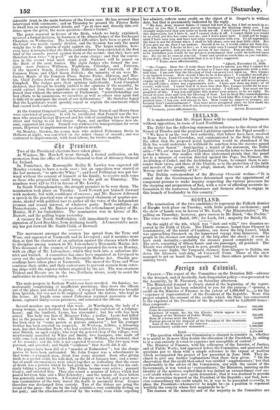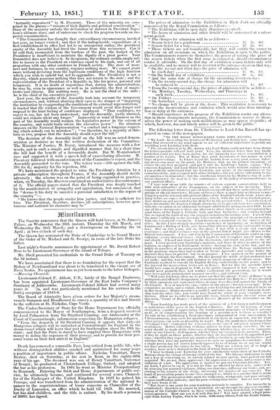forrigu aub Culnuial.
FRANCE.—The report of the Committee on the Dotation Bill—adverse to the demand, and of decidedly Anti-Imperialist policy—was presented to the Assembly, by M. Piscatory, on Saturday afternoon. The Ministerial demand is clearly stated at the beginning of the report. "A project of law has been submitted to you for the purpo§e,,T opening a credit on the Minister of Finance to the extent of 1,800,000-1,...-es for the 'expenses of representation' of the President of the Republic. Were this project adopted, the amount of the credits which the State has consecrated to the expenses of the President of the Republic would be 3,420,000 francs; thus composed—
Allowance. francs 600,000 Frei s de representation 000,000 Expenses of repair, &c. for the Elysee, which appear in the budget of the Minister of Public Works. 240,000
Rent of a house next the Ely-see 35,000
Portion placed at the disposal of the President of the charitable fund of the Minister of the Interior 130,000 Extraordinary credit now demanded 1,800,000 Total. 3,420,000
"The question which your Commission is charged to consider is, whether it is useful to do more than double the allocation of the President., by adding to it a sum entirely devoted to expenses not susceptible of control."
The Minister of Finance, with his colleagues of the Interior, of Justice, and of Public Works, had appeared before the Committee, and answered the questions put to them with a simple reference to the expose of motives which accompanied the project of law presented in June 1850. They de- clined to give any further explanations than those then given. " On the observation that the credit then asked was entitled supplementary,' but that conformably to the advice of the Commission, and with the assent of the Government, it was voted as extraordinary,' the Ministers, insisting on the identity of the motives, replied that it was indeed an extraordinary and an- nual credit which was now again demanded ; that it was destined to provide for the necessities imposed on the President of the Republic ; and that, how- ever extraordinary the credit might be, it was to be presented annually, to place the President—whomsoever be might be—in a position to represent worthily the country whose first magistrate he is."
The reasons of the minority and of the majority in the Committee are textually reproduced" by M. Piscatorv. Those of the minority are com- prised in the phrase—" reasons of high dignity and political consideration " ; those of the majority embody the declaration of distrust in President Napo- leon's ultimate aims, and of endeavour to check his progress towards an im- perial consummation. "The Commission has thought that extraordinary circumstances, invoked last year, no longer existed ; and that if the indispensable expenditure of a first establishment in office had led to an unexpected outlay, the provident equity of the Assembly had freed the future from this recurrence. Can it be said that, exonerated from the burdens of the past, the budget of the Presidency is insufficient_to maintain the dignity of a great power. Your Committee does not believe it. In its opinion, the ordinary credits amply suf- fice to insure to the President an existence equal to his rank, and out of all proportion with any other existence in French society. The state of man- ners and fortunes, m our country, requires nothing. more. We cannot grant more without deviating from the legitimate conditions of the high function which you wish to uphold but not to aggrandize. The Presidency is not a Royally, which possesses nothing that does not return to the state ; and the representation of the President of a Republic is, like his power, personal and temporary-. It is no doubt of importance that, during his administration, he may be, even in appearance as well as in authority, the first of magis- trates and citizens. But nothing more. He is not the chief of the state ; he is the chief of the executive power." Last year, the majority of the Assembly took into account the temporary circumstances, and, without shutting their eyes to the danger of "impairing the institution by exaggerating the conditions of its external representation," it trusted that the wisdom of the Government would avoid this danger and respond to the kind feeling of confidence displayed. "That confidence, we regret to say, has not been understood; and the Assembly, justly alarmed, could not remain silent any longer." Insincerity or want of firmness on the part of the Assembly would weaken the legislative power in the esteem of the country, and would badly advise the executive power " : the situation imposes on the National Representation "a conduct and a language respect- ing which nobody can be mistaken" ; "we therefore, by a majority of thir- teen to two, propose that the Assembly should reject the bill."
The decision of the Assembly itself on the bill was an acted demon- stration as decisive as was the written declaration of the Committee. The Minister of Justice, M. Royer, introduced the measure with a few words, and in such a simple and dignified manner that for a short time The bill had the benefit of a favourable doubt. But M. Montalembert rose and supported it with a speech full of exacerbating allusions. M. Placatory followed with anenforeement of the Committee's report, and the Assembly proceeded to the vote. The voices were-396 against the bill, 294 for it majority for the rejection, 102. We haye mentioned the project to raise the President's dotation by a private subscription throughout France, if the Assembly should decide adversely : the scheme was on the point of being organized in practice, when, on Tuesday, the Moniteur contained an authoritative discountenance of it. The official papers stated that the President was deeply touched by the manifestation of sympathy and approbation but announced, that fie deems it his duty to sacrifice a personal satisfaction to the repose of the country "— " He knows that the people render him justice, and that is sufficient for him. The President, therefore, declines all subscriptions, however spon- taneous and national its character may be."



























 Previous page
Previous page